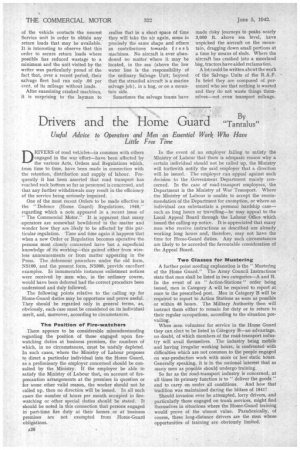Drivers and the Home Guard 1T " . an B t Y a.us"
Page 28

If you've noticed an error in this article please click here to report it so we can fix it.
Useful Advice to Operators and Men on• Essential Work Who Have Little Free Time
DRIVERS of road vehicles-1n common with others engaged in the war effort—have been affected by the various Acts, Orders and Regulations which, from time to time, have been made in connection with the retention, distribution and supply of labour. Frequently it has been asserted that road transport has reached rock bottom so far as personnel is concerned, and that any further withdrawals may result in the efficiency of the service being seriously impaired.
One of the most recent Orders to be made effective is the "Defence (Home Guard) Regulations, 1940," regarding which a note appeared in a recent issue of "The Commercial Motor." It is apparent that many operators are somewhat bewildered in the matter and wonder how they are likely to be affected by this particular regulation. Time and time again it happens that when a new Order or Regulation becomes operative the persons most closely concerned have but a superficial knowledge of its working—this gained either from wireless announcements or from matter appearing in the Press. The deferment procedure under the old form, NS100, and the present form, NS300, Provide excellent examples. In innumerable instances enlistment notices were received by men who, in the ordinary course, would have been deferred had the correct procedure been understood and duly followed.
The following points relative to the calling up for Home-Guard duties may be opportune and prove useful. They should be regarded only in general terms, as, obviously, each case must be considered on its individual merit, and, moreover, according to circumstances.
The Position of Fire-watchers There appears to be considerable misunderstanding regarding the position of those engaged upon firewatching duties at business premises, the numbers of which, in no circumstances, must be unduly depleted. In such cases, where the Ministry of Labour proposes to direct a particular individual into the Home Guard, as a preliminary the employer concerned should be consulted by the Ministry. If the employer be able to satisfy the Ministry of Labour that, on account of fireprecaution arrangements at the premises in question or for some other valid reason, the worker should not be called up, then no direction will be issued. In all such cases the number of hours per month occupied in firewatching or other special duties should be stated. It should be noted in this connection that persons engaged in part-time fire duty at their homes or at business premises are not exempted from Home-Guard obligations.
In the event of an employer failing to satisfy the Ministry of Labour that there is adequate reason why a certain individual should not be called up, the Ministry will forthwith notify the said employer that a direction will be issued. The employer can appeal against such decision to the Government Department mainly concerned. In the case of road-transport employees, the Department is the Ministry of War Transport. Where the Ministry of Labour is unable to accept the reconimendation of the Department for exemption, or where an individual can substantiate a personal hardship case— such as long hours or travelling—he may appeal to the Local Appeal Board through the Labour Office which issued the calling-up notice. It is appreciated that many men who receive instructions as described are already working long hours and, therefore, may not have the time for Home-Guard duties. Any such circumstances are likely to be accorded the favourable consideration of the Appeal Board.
Two Classes for Mustering A further point needing explanation is the "Mustering of the Home Guard." The Army Council Instructions state that men shall be listed in two categories—A and B. In the event of an "Action-Stations " order being issued, men in Category A will be required to report at once to the prescribed post. Men in Category B will be required to report to Action Stations as soon as possible or within 48 hours. The Military Authority then will instruct them either to remain for duty or to return to their regular occupations, according to the situation prevailing.
When men volunteer for service in the Home Guard they can elect to be listed in Category B—an advantage, no doubt, of which members of the road-transport industry will avail themselves. The industry being mobile and having irregular working hours, is confronted with difficulties which are not common to the people engaged on war-production work with more or less static hours. Generally speaking, it is in the national Interest that as many men as possible should undergo training. So far as the rbad-transport industry is concerned, at all tithes its primary function is to " deliver the goods and to carry on under all conditions. And how that tradition was maintained during the blitzes of 1941!
Should invasion ever be attempted, lorry drivers, and particularly those engaged on trunk services, might find themselves in situations where the Home-Guard training would prove of the utmost value. Paradoxically, of course, these long-distance drivers are the men whose opportunities of training are obviously limited.




















































